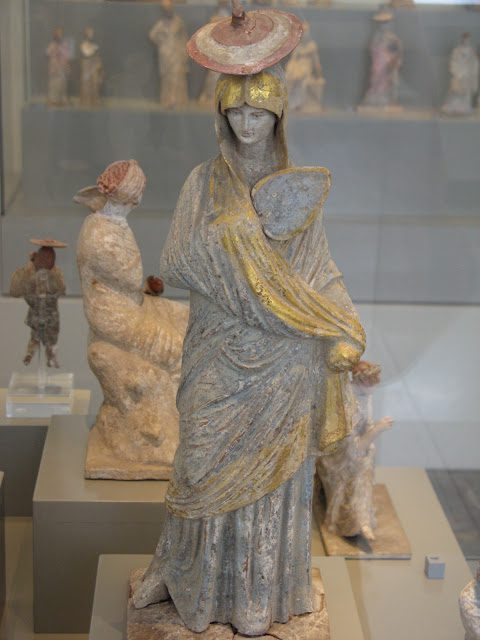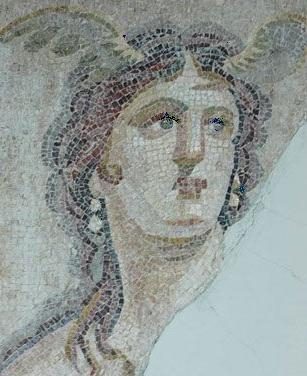Paul wanted his churches to exhibit a modesty and propriety recognized by the surrounding culture, especially in worship.
(1 Corinthians 14)
THE BAKER ILLUSTRATED BIBLE COMMENTARY P.1303
An Overview of Paul’s Epistle
Most outlines of Paul’s first letter to the Corinthians include what we are about to read next under a smaller heading of ‘spiritual gifts’ or ‘the gifts of tongues and prophesy’ as part of a larger section of the epistle — as a conclusion of the previous chapters.
Remember that like our letters to anyone it had no chapters.
Without returning to my original introduction to 1 Corinthians, I would like to point to these larger points of Paul’s letter here:

- Introduction & reason for writing to the Corinthians
- Response to their questions [chaps. 7-16]
- Recommendation of others & closing
One of the central cultural issues of propriety and order the Apostle has addressed in response to several Corinthian questions is that of the role of women.
Within the Apostle’s response to the Corinthian elders some of these issues include:
* Immorality in the Church (5:1–6:20)
These issues applied to men certainly affect all women.
- But actually, I wrote you not to associate with anyone who claims to be a brother or sister and is sexually immoral or greedy, an idolater or verbally abusive, a drunkard or a swindler. Do not even eat with such a person.
- 1 Cor 5:2
- Flee sexual immorality! Every other sin a person commits is outside the body, but the person who is sexually immoral sins against his own body.
- 1 Cor 6:18
Marriage in the Church (7:1–40)
- 3 A husband should fulfill his marital duty to his wife, and likewise a wife to her husband.
- 10 To the married I give this command — not I, but the Lord — a wife is not to leave her husband.
Liberty in the Church (8:1–11:1)
This section ends with Paul's personal example:
Imitate me, as I also imitate Christ.
AND — (as introduction to our current larger section of his epistle) — the Apostle continues by encouraging those who have done so.
Worship in the Church (11:2–14:40)
Now I praise you because you remember me in everything and hold fast to the traditions just as I delivered them to you.
3 But I want you to know that Christ is the head of every man, and the man is the head of the woman, and God is the head of Christ.
Intro to Apostolic instructions about Head Coverings
- Roles of Men and Women in the Church (11:2–16)
- The Lord’s Supper (11:17–34)
- Spiritual Gifts (12:1–14:40)
The Context of Worship – A.D. 55 or 2025 CE
As you can see, the Apostle has introduced this smaller section of his letter about spiritual gifts in the context of worship
AND that he has already addressed some of the roles of men and of women who worship the Lord Jesus Christ as the Apostle has ‘delivered‘ ‘the traditions’ to them.
What is propriety?
- for a first century Corinthian
- or (for example) a 21st c. Cincinnatian

This photo next to the BAKER commentary for 1 Corinthians 14 got my attention to focus back on
the propriety and modesty of a classic Corinthian woman.
Propriety – conformity in socially acceptable conduct and speech, appropriateness, fear of offending against conventional rules of behavior especially between the sexes.
In light of this, consider propriety from the earlier BAKER quote.
At Corinth he [Paul] was particularly concerned about women’s reputation. For women modest draped clothing with a head covering was common. (see 1 Corinthians 11:2-16),
as seen here in a sculpture from 300 BC (Tanagra, Greece)
ibid.
Here is more background on the culture of Corinth named for a goddess descended from the Greek Titans [also pictured on our cover to this post].

In Greek mythology, Tethys was Consort of Oceanus, father of the river gods and goddesses including a Greek goddess who founded Corinth named Ephyra.
The Greeks and Romans honored many gods and goddesses of culture and worshipped these with some order and propriety, while worship of others included temple prostitutes, so much debauchery and excess witnessed in festive celebrations.
(Sound familiar, 21st c. christian?)
Yet the modesty of a proper woman is important to the Corinthians, both men and women, thus the Apostle’s insistence on the propriety of head-coverings in worship of the church.
What’s allowed in proprietary worship of God?
1 Corinthians 14:
Concerning Prophesy and Tongues
Pursue love and desire spiritual gifts, and especially that you may prophesy.
.. The person who prophesies is greater than the person who speaks in tongues, unless he interprets so that the church may be built up.
.. — since you are zealous for spiritual gifts, seek to excel in building up the church.
13Therefore the person who speaks in a tongue should pray that he can interpret.
Who’s in charge?
Using several references from Paul's letters to the Corinthians in "DIVINE PROVIDENCE," STEPHEN CHARNOCK [pub. AD 1680, updated 2022] provides us with a helpful overview of the Apostle's thinking:
The edification of the church is the great end that we are commanded to work toward:
Stephen Charnock – DIVINE PROVIDENCE, p.146
Since you are eager for manifestations of the Spirit, strive to excel in building up the church.”
1 Cor, 14:13 – ibid.
Then, under the heading 'The Gifts and Common Grace of Bad Men and Women' Charnock addresses Paul's order of propriety mentioned in this and other epistles.
God is the giver of gifts, Christ is the governor of those gifts, and all is for your sake.
ibid.
I find this particularly helpful.
Think of it:
God the Father (or because of their Oneness in substance, God the Father, Son and Holy Spirit) — who created ALL things —
charges CHRIST (Jesus, the Person of the Son of Man and Son of God) — THE CORNERSTONE of the Church — as its governor —
with perfect distribution of the gifts to the church — gifts that GOD has given to the church for the LORD’s divine purpose for the sake of those chosen before creation to worship him .
Now think of Jesus' parable of the wheat and the tares for this next one:
There are some husks that come up among men and women, and God uses them to shelter the church in common works, and he [GOD] restrains these men and women through the knowledge of Christ.
God gives gifts to them out of love for his church, not out of love for them.
DIVINE PROVIDENCE, P.147
Get a grip on this: it’s not about YOU — God’s love is about HIS CHURCH.
REMEMBER, what the Apostle has just written?
- IF I [do any of so many things]
- BUT have NOT [agape {love}]
- I am nothing
- and I gain nothing.
Dearly beloved,
Do you take this bond of your church to have and to hold..?
OR is our desire to try out relationships of LOVE —
to try out church es
— NOT having or holding any commitment to Christ Jesus and His body the Church?
What then, brothers?
We realize that this is not a politically correct question in this common era (and some English translations soften it), but Paul uses the Greek word ἀδελφός - adelphos - a masculine noun for brethren.
What then, brothers? When you come together, each one has a hymn, a lesson, a revelation, a tongue, or an interpretation.
Let all things be done for building up.
The Apostle, under Christ, under God addresses the men of the church — not the women saints of Corinth — as was proper in Corinthian culture.
The Apostle has addressed:
- quarreling among you, my brothers. (1:11)
- But I, brothers, could not address you as spiritual people, but as people of the flesh, as infants in Christ. (3:1)
- But now I am writing to you not to associate with anyone who bears the name of brother if he is guilty of.. [a long list of sins] (5:11)
Brothers, do not be children in your thinking. Be infants in evil, but in your thinking be mature.
Order and Propriety
Each of you (brothers).. (not the sisters.. and not ONLY the pastor in charge under Christ).
What then is it, brothers? When you may come together, each has a psalm, has a teaching, has a revelation, has a tongue, has an interpretation.
Let all things be done for edification.
1 Corinthians 14:26 Berean Literal Bible – [more study]
- Tongues?
- two or three at most
- in turn &
- must have interpretation
- Prophets?
- two or three
- others weigh in on what is said
- IF a personal revelation is made to one present, the man receiving it must remain silent.
- all may profit by learn and be encouraged by (this kind of) prophesy
- prophets are subordinate [hypotassōto] to each other
Now do not be offended by Paul's next orderly instruction for worship — for it uses the same Greek word [hypotassō] — for the Corinthian women of propriety and modesty expected in worship.
For God is not a God of confusion but of peace.
As in all the churches of the saints, the women should keep silent in the churches.
For they are not permitted to speak, but should be in submission , as the Law also says.
Note that the Apostle — who has been addressing order and propriety in worship throughout his epistle to the saints of Corinth — also speaks to ALL the CHURCHES [ekklēsia] of the SAINTS [hagios].
ARE YOU, beloved 21st century worshipers of the Lord Jesus Christ, not also His saints?
and we have believed,
Gospel of John 6:69 ESV – Simon Peter to the Lord Jesus
and have come to know, that you are the Holy One [hagios] of God.”
Yes, the women of Corinth and of your 21st century church could be of the Holy Ones - saints - of God; so don't be offended by what the Apostle Paul next instructs the saints by the Spirit - even if God formed you as a woman.
If there is anything they desire to learn, let them ask their husbands at home. For it is shameful for a woman to speak in church.
Paul then proceeds to instruct ‘the brothers’ in those issues the apostle has already addressed, prophesies and spiritual gifts (essentially reiterating ‘listen to me about these things).
And the Apostle Paul’s conclusion to this large section of his letter to the Corinthian saints
— who are of course free from the Law (as servants of God, Christ and each other) —
But let all things be done properly and with order.
And since Paul's epistle (like any letter) lacks chapters, what does the Apostle NEXT remind the Corinthians -- the saints of Christ's Church?
About THE RESURRECTION.
Comment on Scripture – Share the Gospel





